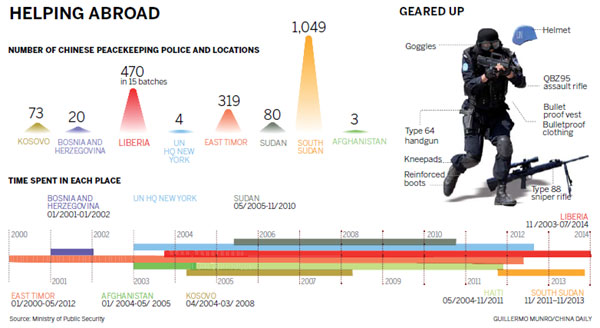Keeping the peace

| The second batch of the China Peacekeeping Formed Police Unit deployed to Liberia conducts an exercise on May 4 in Langfang, Hebei province before departure for Liberia. The unit has 140 police officers and started the peacekeeping mission in June. Wang Jing / China Daily |
| Chinese peacekeeping police in armed patrols with local police and officers with the United Nations Mission in Liberia in December. China Daily |
| A Chinese peacekeeping officer patrols Cestos, Rivercess county, Liberia, in March. Gao Xuede / China Daily |
Chinese peacekeepers work the ground as part of the country's increasingly important role in United Nations peacekeeping efforts
Shivering with fever and vomiting incessantly, Zou Benshuang knew he had caught malaria again. It was the third time the Chinese United Nations peacekeeper had contracted the disease in his eight months in Liberia. Zou, 32, recalled not even being able to raise his arm to ask for water at his bedside. "Life there was really tough, but the experience is invaluable," the peacekeeping policeman says.
Although he had received six months of physical and psychological preparation in China for his deployment to Liberia, Zou was still shocked by the conditions during his first week there.
Basic necessities became a luxury. He had to eat instant noodles for all his meals and slept on beds made of wire netting.
Besides Zou, another 139 Chinese UN peacekeepers shared similarly unforgettable instances of facing natural adversaries and social instability during their eight-month stint in the West African country.
They formed the first group of the China Peacekeeping Formed Police Unit deployed to the country in October last year.
The officers are part of the growing role of Chinese personnel in the UN peacekeeping effort in the world's troubled and needy spots.
Liberia, one of the world's poorest countries, was still recovering from its 14-year civil war. Armed factions were embedded in large swaths of jungle.
The United Nations Mission in Liberia was established in 2003 to support the local peace process, and the first batch of China police officers was deployed there to help with safety and reconstruction.
Infrastructure like roads, telecommunications, schools and hospitals were expectedly inadequate in Liberia, says Peng Haiwei, the squad's adviser.
"The mission has been going on for a decade. The camp of the Chinese peacekeeping police in Greenville, capital of Sinoe county in Liberia, was basically a wasteland," he says.
Peacekeepers later spent 100 days to build 39 rooms and a 160-square-meter dining hall.
But clearing the wasteland was easy compared with the harsh weather and environment. Temperatures sometimes hit 44 C. Rainstorms went on for months. Life-threatening species like scorpions, spiders, snakes and malaria-carrying mosquitoes were common, he says.
The climate made it easy for diseases to spread. Plague and AIDS also threatened peacekeepers. The World Health Organization confirmed in March that Liberia was facing the deadly Ebola virus.
"We disinfected the camp every day and take protective and preventive medicine every half month," squad nurse Gao Zhiheng says.
Twenty-two people still contracted malaria, she says.
Local threats
The armed factions hiding in the forests engage in criminal activities including drug and weapons smuggling, kidnapping and robbery targeting local villagers, says Xu Liang, the squad's deputy commander.
"There were no police posts covering the deep forest and there was no way for the villagers to report these crimes," he says.
Faced with civil war, the local police were also ill-equipped to fight crime and had to seek help from the foreign peacekeeping police.
Sun Wei, a senior officer from the Ministry of Public Security's International Cooperation Bureau, says the Chinese police unit included one command center, three combat teams and one logistics support team in Liberia. There were six army doctors and nurses to help the counties of Sinoe, Rivercess and Grand Kru.
"Because we didn't have judicial powers in Liberia, the main duties were to help local authorities cope with emergencies and to help ensure the safety of local people and infrastructure," he says.
The Chinese forces also helped train local police officers in criminal investigation and combat, he says.
"Once we received the specific task order from the United Nations Missions in Liberia, we would rush to the scene to assist in fighting crime," Xu says.
In a typical case last October, the Chinese officers arrived in Greenville and received an order from the UN over a mass incident in Sinoe.
They armed themselves with weapons including tear-gas guns, stun guns and police batons to assist local authorities.
At the scene, more than 400 citizens were destroying roads and blocking vehicles to protest against the government's decision in rejecting an Indian enterprise to occupy land to plant palm trees. The protesters felt that the company would be able to provide them with jobs.
"Some of them fought with the Liberian police. The safety of many people were threatened by the angry protesters," Xu says.
The Chinese officers immediately pulled a cordon to evacuate the crowd and protect the people and facilities. After an hour of negotiation, the protesters and authorities reached a settlement, he says.
Aside from carrying out orders from the UN, the Chinese peacekeepers also conduct armed patrols on the streets or take helicopters deep into the remote forests of Rivercess or Grand Kru to investigate crimes reported by villagers, Peng says.
"We arm ourselves based on the severity of the crimes reported," he says.
Their armament also included pistols, submachine guns, sniper rifles, bulletproof clothing and reinforced boots, he says.
Some of the most challenging work included missions deep in the forest. They had to carry at least 15 kg of equipment each on long treks under the sweltering sun and face the threat of being attacked by armed suspects, he says.
In March, the Chinese troops accompanied local police to investigate criminal activities in Shatan town of Rivercess county, where gunshots could be heard constantly, he says.
The Chinese peacekeepers later helped Liberian police set up the first local police station in the mountains.
Since March, the number of criminal activities in Shatan declined by 30 percent compared with 2013.
During their eight-month stint, the Chinese peacekeeping police assisted in at least 27 tasks including those involving mass incidents and armed patrols.
Chinese technical experts and advisers also provided skills and tactics training to Liberian police to improve their combat capabilities, Sinoe county inspector Augustine Swen says.
"The Chinese police's efforts were conducive to promoting the relationship between China and Liberia, and enhancing the sense of security among local people. They made great contributions to rebuilding work and social development in Liberia," he says.
To recognize their outstanding contributions, the Chinese peacekeeping police in Liberia were awarded the UN Peace Medal in April.
More deployment
China, the largest contributor of personnel to the UN peacekeeping mission, will provide more expertise and training to fight transnational crimes apart from its traditional role of maintaining security and order, Sun, from the international cooperation bureau, says.
"On top of maintaining traditional public order and political stability, the peacekeeping tasks will become increasingly professional and specialized," he says.
Since 2000, China has deployed 2,032 peacekeeping police to eight countries and regions including Kosovo, Liberia, Afghanistan, Haiti and Sudan, Sun says.
China will facilitate training for foreign police officers and send more instructors and technical experts to help with security for large-scale activities, criminal investigation techniques, cyber security, exit and entry management, as well as some counter-violence or counterterrorism activities, he says.
"To further help UN peacekeeping efforts, we plan to send more police personnel to some African and European countries, such as Liberia and Cyprus, to provide skills training for local police and to improve their combat capabilities," says Yang Shaowen, deputy director under the ministry's International Cooperation Bureau.
China's latest contributions to Liberia for peacekeeping come amid the increasing threat of transnational organized criminal activity, including drug and arms smuggling, cybercrime, human trafficking and sexual offences, Yang says.
Dmitry Titov, an assistant secretary-general at the UN, says that among the five permanent members of the UN Security Council, China provides the highest number of peacekeeping police personnel and troops.
China will play a more active role in offering special training, experts, criminal investigation techniques and funding to countries in need, he says.
"Currently, we are working in environments with asymmetric and unconventional threat - including sectarian divisions, piracy and social tension.
"Peacekeeping will need to be more mobile, more flexible and adaptable."
Contact the writers throughzhangyan1@chinadaily.com.cn

(China Daily Africa Weekly 08/01/2014 page16)
Today's Top News
- China reports 5% GDP growth in 2025
- Sanya rises as magnet for Russian tourists
- China's steady opening-up for Asia-Pacific economic growth
- Blueprint seen as a boon for entire world
- 'Kill line' an inevitable outcome of US system
- Fusion energy drive entering a decisive phase
































